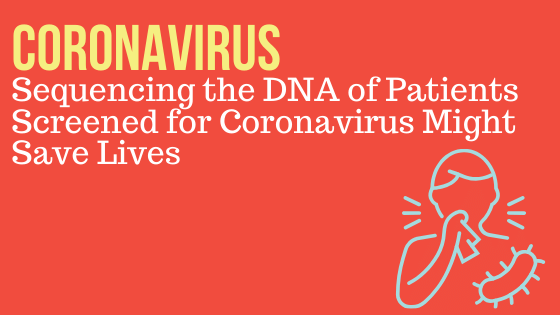Richard Buggs, Queen Mary University of London and Richard Alan Nichols, Queen Mary University of London
Scientists should start sequencing the genomes of coronavirus patients. We should look for DNA differences between patients who are severely affected and those with mild symptoms. This could allow us to predict who else would be vulnerable and advise them to take precautions. We may be able to use this knowledge against the coronavirus epidemic before a vaccine is widely available.
In particular, it would be valuable to know if key DNA variations are shared by those rare people who are young and appeared to be healthy but developed severe symptoms from the coronavirus. We might then be able to predict which doctors and nurses are most at risk and remove them from the front line.
Of course, we don’t yet know if accurate predictions will be possible. We don’t even know if someone’s chances of severe symptoms from the coronavirus are affected by their genes. We could, however, answer these questions relatively cheaply and rapidly by using commonplace DNA sequencing technology.
Read more:
Will warmer weather stop the spread of coronavirus?
We would need to sequence the whole genomes of coronavirus victims who need intensive care and compare them with the genomes of people who have only mild symptoms. With only a few thousand genomes from each category, we could quickly find out if there is mileage in this approach.
It may be that just one or two genes are involved. Perhaps broken genes involved in the immune system or lung cell surfaces. If so, we could quickly discover them using a method called genome-wide association study. If just a couple of broken genes make all the difference, a genetic test for coronavirus susceptibility could be simple to make, cheap and accurate.
It may be that there are thousands of genes involved. Perhaps a complex mix of genes involved in lung physiology, upper respiratory tract shape, and many other things we have never even thought of. If this is the case, working out exactly what is going on could take decades. But we need answers within weeks or months.
Inspired by trees
Here we can draw on an unexpected source of inspiration: we can use a method called “genomic prediction”, which has been used successfully for decades by plant and animal breeders, but is seldom used in medicine. It enables the prediction of complex traits from whole-genome sequences, even when we do not understand what any of the genes are doing.
With this approach, we do not need to spend several years working out what exactly is going on. We can construct a score from a person’s whole-genome sequence that predicts their susceptibility. These scores could be obtained at the cost of (we estimate) only a few hundred pounds per person.
We took a genomic prediction approach last year for ash trees, which are dying from a fungal epidemic. By comparing the genomes of healthy versus dying trees, we discovered over 3,000 points in their genomes that contribute to susceptibility. Some of these were in genes that had known functions in host defences, but for many others, we had no idea what they did. Yet we did not need that knowledge to predict the susceptibility of other ash trees with a useful level of accuracy.
Read more:
Ash dieback: one of the worst tree disease epidemics could kill 95% of UK’s ash trees
We should do similar studies on humans and coronavirus. Of course, there would be more complex issues of privacy and consent than we had to deal with for ash trees. But tens of thousands of human genomes have already been sequenced around the world, so the issues around consent have been well explored. For some coronavirus patients, their genome will already be in a database.

Should we find that we can make accurate predictions, the moral and psychological challenges would be severe. Where should tests be deployed? Will people respond appropriately if they are predicted to be at risk (or not)? How would it affect health insurance? But difficult challenges are faced in every decision that we have to make in our battle against the virus.
Read more:
Homemade hand sanitiser recipes that could help protect against coronavirus
Research on the genetic basis of susceptibility to the coronavirus could be done quickly and without diverting resources from research on treatments and vaccines. It might show that predictions are impossible. It might show that accurate predictions can be made. We don’t know. But we need to find out. If it worked, it might protect thousands of lives before a vaccine is widely available.![]()
Richard Buggs, Professor of Evolutionary Genomics, Queen Mary University of London and Richard Alan Nichols, Professor of Genetics, Queen Mary University of London
This article is republished from The Conversation under a Creative Commons license. Read the original article.
WOULD YOU LIKE TO SEE MORE ARTICLES LIKE THIS? SUBSCRIBE TO THE ISHI BLOG BELOW!
SUBSCRIBE NOW!


